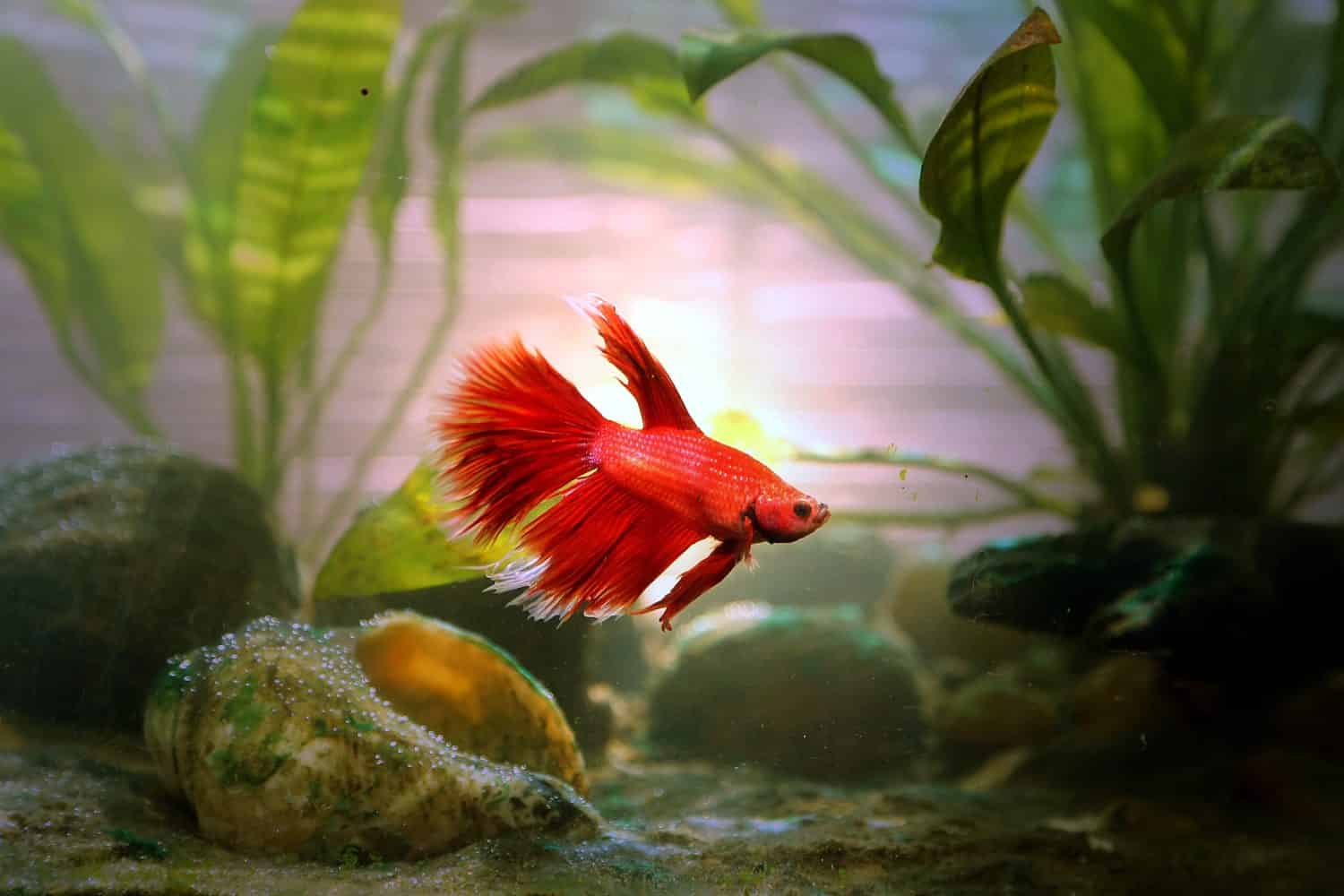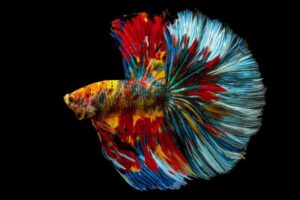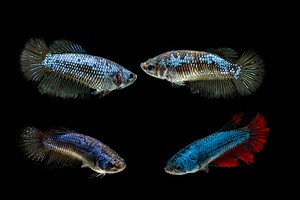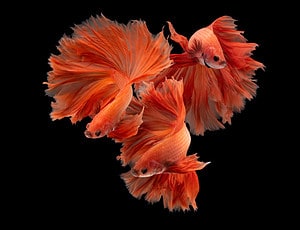If you find white specks on your betta fish that resemble salt, your fish could be infected with ich or white spot disease. Ich is a common disease in betta fish that can be difficult to treat without the appropriate medications.
Infected betta fish may not show many symptoms at first, aside from appearing as if they swam underneath a saltshaker. As the severity of the disease progresses, betta fish can become quite ill and eventually die without proper treatment.
If your betta fish has ich, you may find this article helpful in understanding the parasites and how you can treat them.
What Is Ich or White Spot Disease?
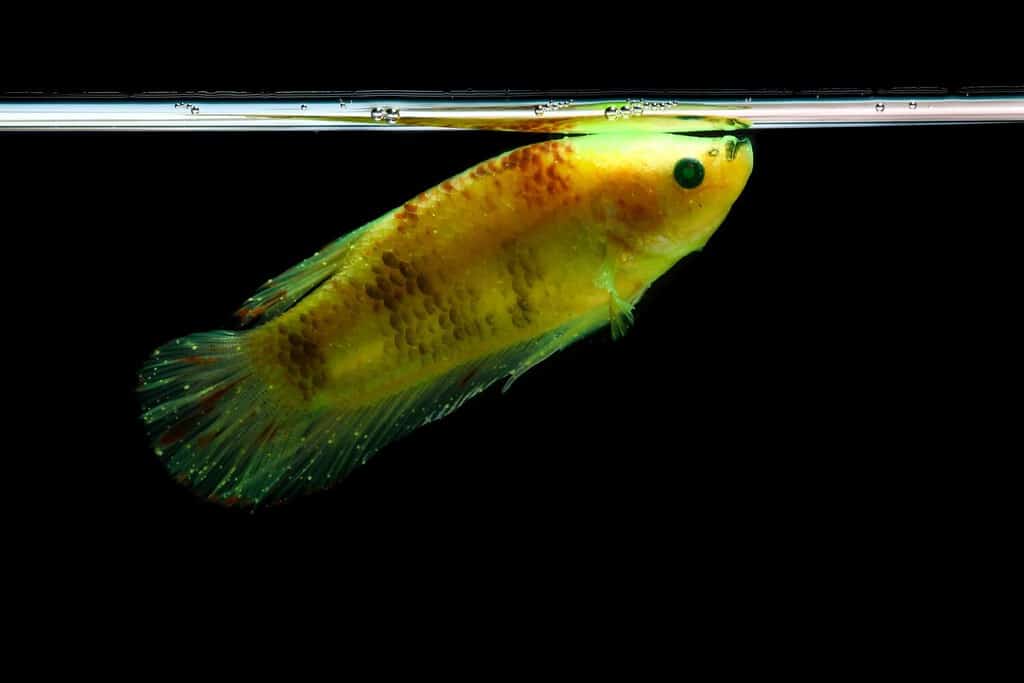
Ich is a protozoan parasite that commonly infects betta fish.
©Rumaisha Project/Shutterstock.com
Ich is the abbreviation of ichthyophthirius multifiliis, a protozoan parasite with a complex life cycle. These parasites cause white spot disease, but some call it by its pronunciation “ick”. It was first described in 1879 by French parasitologist Fouquet as a parasitic ciliate. Ich can infect most freshwater fish and similar parasites, Cryptocaryon irritans, can infect marine fish.
The ich parasites only survive in water and are not transferrable to humans. Tropical fish are more likely to get ich because the parasites prefer warmer water temperatures. However, ich can be found in cold water aquariums too.
Most aquariums are the perfect breeding ground for ich parasites and even the most well-maintained betta fish tank is no exception. The parasites appear small and raised, similar to granules of salt or sugar. They can attach themselves to different parts of your betta’s body, such as their fins, gills, and skin.
Lifecycle of Ich In Aquariums
Ich parasites undergo several phases and are called trophants in their parasitic phase. The trophants feed on the bettas (the host) epithelium layer and appear as visible white spots. Once the trophants leave the host, they develop into tomonts and eventually burst into infectious theronts.
The tomonts can attach to different surfaces in the aquarium, such as any substrate, plant, or tubing. This is how ich can spread easily amongst fish even if they are out of the parasitic phase. If left untreated, the newly infectious theronts can infect your betta fish and the cycle repeats. The theronts are active swimmers and will find a suitable host to attach themselves to.
Understanding Ich on Betta Fish
Here’s what you need to know about ich on betta fish.
What Causes It?
Betta fish can be infected with ich for a variety of reasons, although it is generally related to stress, improper water temperatures, or poor water quality. When a betta fish is feeling stressed, they are more susceptible to different diseases that would have been strong enough to fight off when they were healthy.
Ich parasites are not always present in aquarium water. They can infiltrate an aquarium through other infected fish or water. Some bettas may already have the parasites if they were infected from the pet store. Ich can also spread to other fish and be transferred from aquariums through infected supplies like nets recently used in other infected aquariums.
Temperature fluctuations can be stressful for bettas and might make it difficult for them to fight off ich. As tropical fish, bettas require a heater in their aquarium at all times with little to no temperature fluctuations.
Signs Your Betta Fish Has Ich
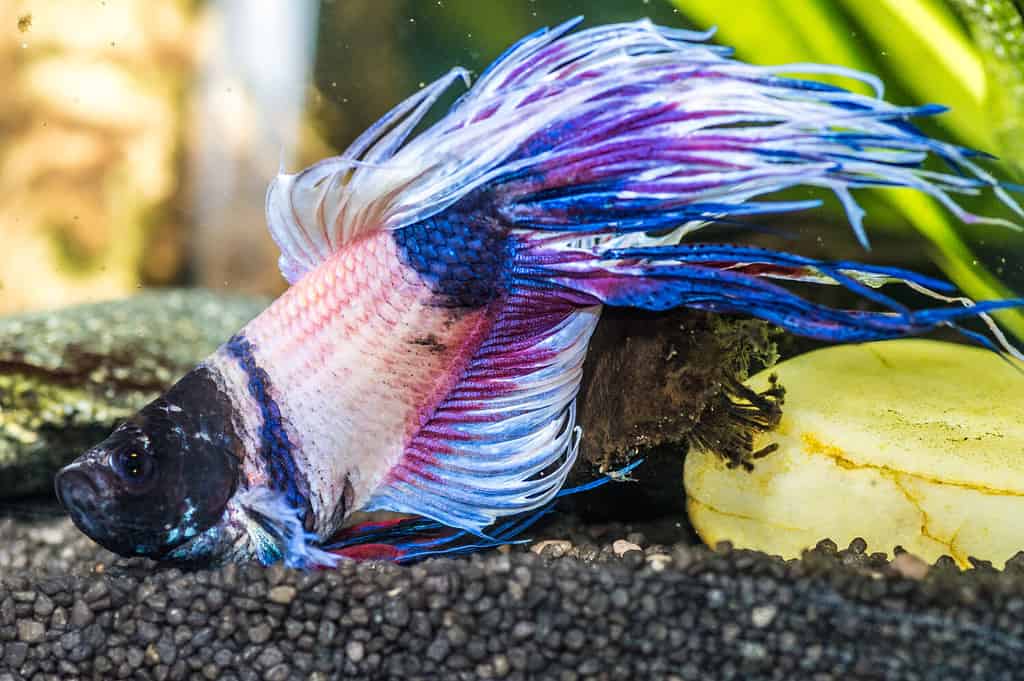
An unhealthy betta fish will appear lethargic and bottom-sit.
©Wirestock Creators/Shutterstock.com
- Small white spots on their body
- Clamped fins
- Lethargy
- Lack of or decreased appetite
- Bottom-sitting.
- Laboured breathing.
- Darting around the tank
- Rapid gill movement
- Rubbing against the substrate, glass, or décor (flashing).
The easiest way to determine whether your betta has ich is to look at their appearance. You can visually spot ich on an infected betta fish by looking for pure white spots on their bodies. This is the ich in their trophant or parasitic stage.
Infected betta fish will also show behavioral changes such as clamped fin, lethargy, and bottom-sitting. If the parasites are eating away at their gills they may struggle to breathe and show signs of rapid gill movement.
The ich parasites eating away at your bettas skin is uncomfortable, so they will rub against different surfaces in the aquarium to try dislodging them. This behavior is known as flashing, and it is a clear sign that your betta is stressed.
Treating Betta Fish with Ich: 5 Trusted Methods
If you suspect your betta fish has ich, following a proper treatment plan is important as this disease can be fatal.
1. Move Your Betta to a Separate Treatment Tank
When treating your betta fish for ich, you will be making adjustments to their aquarium that can disrupt the nitrogen cycle or any live plants inside. It is better to move your betta to a separate tank while they are being treated, known as a hospital tank. The tank does not need to be very large and around 3 to 5 gallons is ideal.
The hospital tank should be equipped with a sponge filter and heater. You want to avoid running a cartridge filter with activated carbon media during treatment as it can interfere with how certain fish medications work.
2. Gradually Raise the Water Temperature
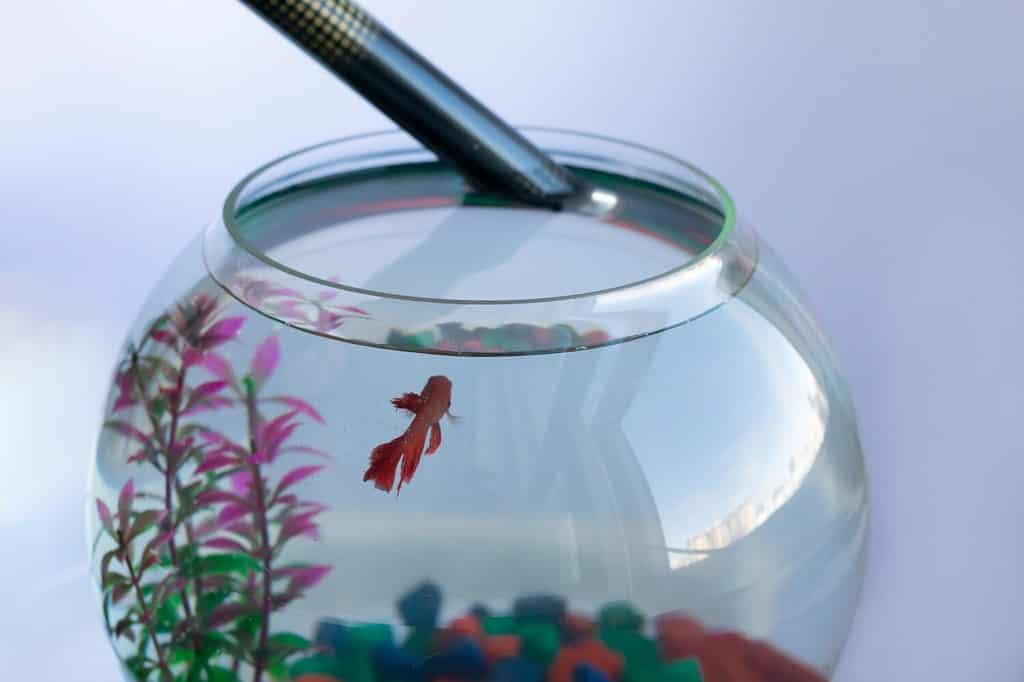
Betta fish need a heater and spacious fish tanks to thrive.
©Sunny_Smile/Shutterstock.com
The most effective way to treat a betta fish ich is by gradually raising the water temperature. Warmer water temperatures speed up the ich parasites’ life cycles and help prevent a re-infestation. The temperature only needs to be heated by two to four more degrees than usual without exposing your betta to uncomfortably warm temperatures.
The ideal water temperature for bettas is around 75° to 80° Fahrenheit (23° to 2° Celsius). When treating betta fish with ich, you can safely increase the temperature to 82° Fahrenheit (28° Celsius) for a short while. It should be done gradually over the next 24 to 36 hours to avoid shocking your betta fish.
Since hot water naturally holds less oxygen, you will need to add an aeration system to the tank. A temporary air stone will suffice during treatment.
3. Use Fish-Safe Medications
After moving your betta to a hospital tank and gradually raising the temperature, the next treatment option is medication. There are various medications on the market recommended to treat ich on betta fish. The medication should ideally contain ingredients like malachite green, methylene blue, copper sulfate, and formalin which are effective against ich.
You can find ich medications for fish at most pet stores. Always follow the directions on the medication label and ensure that the dosages are accurate to avoid harming your betta fish.
Recommended medications:
- API Super Ick Cure
- Hikari Ich-X
- Seachem Cupramine
- Seachem Paraguard
4. Try Salt Dips
You can also do frequent yet short saline dips in a tank with aquarium salt. However, the betta should not stay in a salt dip for more than 10 minutes at a time. You only need to add around one flat tablespoon of aquarium salt for every 5 gallons of water. The salt should not be added to the main aquarium to avoid disrupting the water parameters and beneficial bacteria.
5. Do Frequent Partial Water Changes
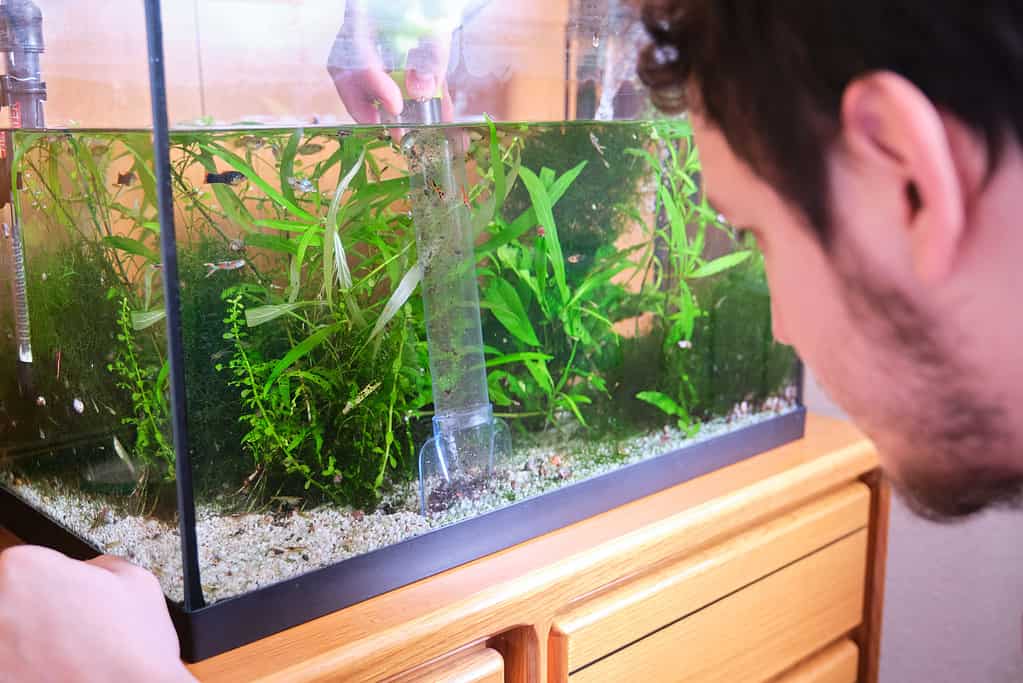
Frequent partial water changes are important when treating ich on betta fish.
©Ladanifer/iStock via Getty Images
As we have already mentioned above, ich parasites go through different life stages. Some of their life stages do not require a host and can attach to surfaces in the aquarium. Doing frequent partial water changes to your betta’s main aquarium helps disrupt their life cycle and prevent the theronts from reinfecting your betta fish. The water changes do not need to be too drastic, as a 25% to 40% water change every six hours is ideal.
Prevention Tips
Prevention is always better than cure when it comes to betta fish diseases. Below are a few prevention tips to use to ensure that your betta doesn’t contract ich.
- Keep your betta in a spacious, well-maintained aquarium over the five-gallon minimum size.
- Ensure that their aquarium is heated and filtered to keep their water clean and at a comfortable temperature.
- Feed your betta fish a specie-appropriate diet and live foods. Their diet should be high in protein because they are carnivores.
- Do frequent partial water changes to dilute their waste products and replenish their aquarium with fresh water. Only a 10% to 25% water change is necessary.
- If you have other aquariums, avoid sharing the supplies between each aquarium to prevent cross-contamination. If you are unable to use different supplies each time, soak them in a solution of white vinegar and rinse them in between use.
- Quarantine any new plants, fish, or invertebrates you add to your betta’s aquarium for a minimum of two weeks.
Ich vs Epistylis
Epistylis and ich are sometimes confused for the same thing, although they are not. Epistylis is the more severe and rarer protozoan parasite infestation than ich. The easiest way to determine whether your betta has ich or epistylis is by looking at their appearance.
Ich parasites are snow white and spread out like sugar or salt granules. Whereas epistylis appears as whiteish-grey patches with fuzzy growths that lack the uniform appearance of ich parasites. Epistylis is generally more difficult to treat than ich and is often fatal for bettas.
Conclusion
Ich is a nuisance to betta fish keepers caused by protozoan parasites. You can spot ich on a betta fish by checking for small, salt-like granules over their fins, bodies, and gills. Treating a betta fish for ich involves moving them to a separate treatment tank, raising the water temperature, and using anti-ich medication. Most betta fish can make a full recovery with proper treatment and live a long and healthy life afterward.
Thank you for reading! Have some feedback for us? Contact the AZ Animals editorial team.

